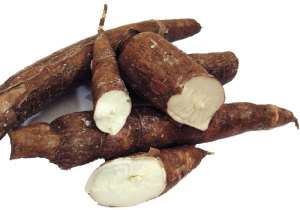
Nigeria’s standards regulator will work with the Cassava Weed Management Project to tackle weeds ravaging cassava fields in Africa, says the Director of Standards Organization of Nigeria (SON), Dr Joseph Odumodu.
The commitment by SON is amid growing concerns over the threat of weeds to cassava production in the country which has kept productivity low and behind other cassava producing nations of Asia.
“Innovations and standards are correlated. So we would want to collaborate with you,” Dr Odumodu said during a courtesy visit to the headquarters of SON in Lagos on 2 March.
The Cassava Weed Management Project which is managed by the International Institute of Tropical Agriculture (IITA), and implemented in collaboration with the National Root Crops Research Institute (NRCRI), Federal University of Agriculture Abeokuta (FUNAAB), and the University of Agriculture Makurdi (UAM) is developing innovations that will reduce drudgery associated with weeding in cassava farms.
The project is exploring a mix of best bet agronomic practices, mechanical weed control, and the use of environmentally friendly herbicides to tackle weeds.
Project Leader, IITA Cassava Weed Management Project, Dr Alfred Dixon said research findings from the project would help reduce the burden faced by women and children.
“It is estimated that women spend about 500 hours per annum to weed, and their children’s education in most cases is compromised as they are withdrawn from school to take care of cassava farms,” Dr Dixon explained.
He commended the SON for agreeing to work with the research team, and to bring on board SON’s expertise in the area of standardization.
The Principal Investigator, IITA Cassava Weed Management Project, Prof Friday Ekeleme said working with SON and other regulatory agencies would bring benefits to farmers.
He explained that weeds were major constraints to cassava, as they undermine the yield and productivity of the root crop.
“In cassava fields where weeds are not properly managed, yield reduction of between 50-80 percent is observed. For instance, if you don’t weed spear grass (Imperata cylindrica), you stand to lose 80 percent of your cassava,” he said.
While expressing concern over the prevalence of obsolete herbicides in the Nigerian market, Prof Ekeleme said the team was carrying out herbicides residue analysis of some herbicides and would request SON’s collaboration in that area.
Other agencies which the IITA Cassava Weed Management Project is partnering with include: the National Agency for Food and Drug Administration and Control (NAFDAC), and National Environmental Standards Regulatory Enforcement Agency (NESREA).###
For information, please contact:
Godwin Atser, Communication & Knowledge Exchange Expert, [email protected]




 Akufo-Addo commissions Phase II of Kaleo solar power plant
Akufo-Addo commissions Phase II of Kaleo solar power plant
 NDC panics over Bawumia’s visit to Pope Francis
NDC panics over Bawumia’s visit to Pope Francis
 EC blasts Mahama over “false” claims on recruitment of Returning Officers
EC blasts Mahama over “false” claims on recruitment of Returning Officers
 Lands Minister gives ultimatum to Future Global Resources to revamp Prestea/Bogo...
Lands Minister gives ultimatum to Future Global Resources to revamp Prestea/Bogo...
 Wa Naa appeals to Akufo-Addo to audit state lands in Wa
Wa Naa appeals to Akufo-Addo to audit state lands in Wa
 Prof Opoku-Agyemang misunderstood Bawumia’s ‘driver mate’ analogy – Miracles Abo...
Prof Opoku-Agyemang misunderstood Bawumia’s ‘driver mate’ analogy – Miracles Abo...
 EU confident Ghana will not sign Anti-LGBTQI Bill
EU confident Ghana will not sign Anti-LGBTQI Bill
 Suspend implementation of Planting for Food and Jobs for 2024 - Stakeholders
Suspend implementation of Planting for Food and Jobs for 2024 - Stakeholders
 Tema West Municipal Assembly gets Ghana's First Female Aircraft Marshaller as ne...
Tema West Municipal Assembly gets Ghana's First Female Aircraft Marshaller as ne...
 Dumsor is affecting us double, release timetable – Disability Federation to ECG
Dumsor is affecting us double, release timetable – Disability Federation to ECG
